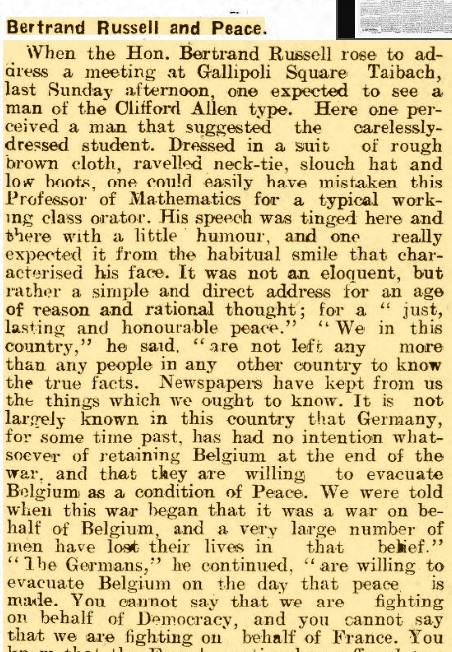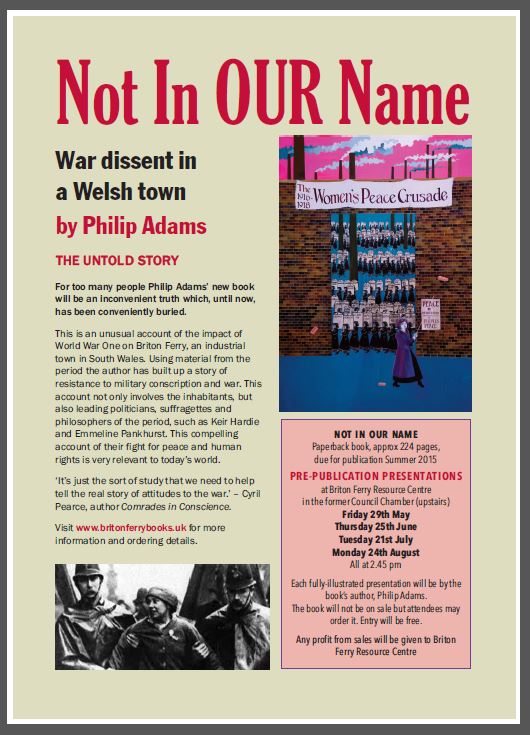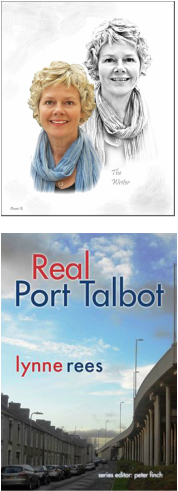
It's the summer of 1915. You're standing on the grass in Gallipoli Square, Taibach. 'Newspapers have kept from us the things we ought to know,' says the man addressing the crowd assembled there, his voice carrying between the chapels, the streets around you that are named for another military conflict. And a seed of doubt is planted in your mind. And then you imagine your son sheltering in a trench in France, remember your neighbour's cries of grief as she read the telegram in her hand ... Deeply regret ... died of wounds ... No, you think, this can't be true. Our boys and men are not dying for nothing. 'Call themselves Pacifists,' your husband said last night after his shift, 'more like bloody cowards!' and thumped the table making the sugar bowl jump.
I am trying to imagine myself in the Taibach crowd listening to Welsh born philosopher, Bertrand Russell, rallying against the war, encouraging conscientious objectors, in July 1915. 100 years later we have a different perspective of the 'war to end all wars', we know of the horror, the ignorance of leaders, the almost inexpressible tragedy of the death of so many young men. I imagine if we could travel back in time we would do our best to bring it to a halt. But it would have been different then. And I also imagine the courage it would have taken to stand apart, to stand up, to stand against what you felt to be so very wrong. And be imprisoned for it. Or on the Front itself, to be killed for it.
Conscientious objectors are on my mind after speaking with Philip Adams, author of A Most Industrious Town, Briton Ferry and its People 1814-2014, whose new book, due to be published at the end of this month, Not In Our Name, War Dissent in a Welsh Town, tells the story of ordinary people resisting military conscription and war, including the involvement of his own grandfather. This is a story of the reality of war.
I am trying to imagine myself in the Taibach crowd listening to Welsh born philosopher, Bertrand Russell, rallying against the war, encouraging conscientious objectors, in July 1915. 100 years later we have a different perspective of the 'war to end all wars', we know of the horror, the ignorance of leaders, the almost inexpressible tragedy of the death of so many young men. I imagine if we could travel back in time we would do our best to bring it to a halt. But it would have been different then. And I also imagine the courage it would have taken to stand apart, to stand up, to stand against what you felt to be so very wrong. And be imprisoned for it. Or on the Front itself, to be killed for it.
Conscientious objectors are on my mind after speaking with Philip Adams, author of A Most Industrious Town, Briton Ferry and its People 1814-2014, whose new book, due to be published at the end of this month, Not In Our Name, War Dissent in a Welsh Town, tells the story of ordinary people resisting military conscription and war, including the involvement of his own grandfather. This is a story of the reality of war.
Philip is giving an advance presentation at the Briton Ferry Resource Centre on 24th August. The book might even be available to purchase on that day. Otherwise you'll be able to reserve a copy or order it from the website once it is available.



 RSS Feed
RSS Feed